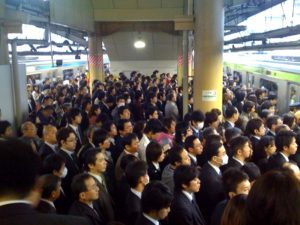
Crisp white dress shirts dot the train car like pimples. Matte ties in dark neutrals coordinate with suit pants. Then, at the feet, a surprise: gorgeous and expensive Italian leather shoes. The sun has set over Roppongi; the Salarymen are going home.
The one across from me is young. His jet-black hair is razor cut to painstaking precision, the feathered neckline and crisp asymmetrical bangs all but screaming “I’m an individual despite my clothes.” His soft-sided black leather briefcase sits across his lap. He stares intently at his phone, thumbs moving rapidly over the screen.
The one next to me is old. His face is weathered from years of not enough sleep and too much air pollution. He holds a paperback over his lap – he’s just started it – but as minutes pass I see the book droop in my periphery. Then I feel hair on my shoulder. He’s fallen asleep. How many times has he reread those first pages?
The train makes a stop. People get off, people get on. An older woman looks around for a seat; there are none. Salarymen see her, make eye contact with her, and then turn back to their phones and pulp fiction. No one moves. She seems unsurprised.
Salarymen are largely regarded as the backbone of the Japanese economy. They work long hours, commute long distances, and seldom take vacation. Every year there is a news clip – or several – about a forty- or fifty-something man literally dropping over dead at his desk. Overworking is such a problem, in fact, that the Japanese government has created more national holidays, and placed several holidays close together during two weeks of the year, in an effort to force vacations.
I often wonder about these men and the families they work to support. Are their wives secretly bitter? As they feed and bathe the children, do they long to trade unending domestic tasks for a commute during which there is nothing else to do but read a book? When their husbands come home stinking drunk, do they worry? Then I remember that most young women work – the dual income family almost as commonplace as it is in America. But there’s no such thing as a salarywoman (officially).
The train is shoulder to shoulder now as we approach Yokohama Station, my transfer. I wonder if I will be able to get up and inch to the door in time to get off. A man teeters in front of me. He’s in a flop sweat that smells like gin. His head bobs as he struggles to remain conscious and standing. As he sways with the train he becomes pale. I’m worried he may vomit on me. He’s worried, too; he slaps his cheek several times and blinks his eyes rapidly. I suddenly wonder what happens if someone throws up on a train. Are there people to clean it up? I ride the train almost every day, to all kinds of places at all different times. I’ve never seen so much as a major spill let alone a bodily fluid.
The train stops. I stand and shuffle to the door. “Sumimassen, excuse me,” I say again and again until I spill out of the train. I follow the crowd to the stairs but turn when I hear someone yelling in English.
“This is for you! This is for you!” a salaryman calls, arm outstretched as he pushes through the crowd to me. He reaches me and I see that he has my phone, and the case that holds my ID, credit card, and cash. “This is for you?” He says again, in his best English.
I take my lifeline, tuck it safely in my bag, and thank him profusely. I even bow, as deeply as I feel comfortable anyway. With downturned eyes I notice his shoes. Italian leather, soft as butter. He’s a salaryman, too. In a moment of impulsivity, I ask him if he likes his work. He looks at me, probably equal parts astonished that a Gaijin is asking him this personal question and that I’m asking in Japanese.
“It is important,” he replies. He quickly bows back, I thank him several more times, and we let the crowd separate us. It’s an answer that raises more questions than it answers, which is to say it’s the quintessential Japanese answer.
I make my connection – barely – and ride another train home. The car is almost empty, save an elderly woman with some groceries and one middle-aged salaryman. His head hangs forward and he snores loudly. He is fast asleep until the train slows down. Magically he is awake, up, and exiting before I realize it’s my stop, too.
How do they do that?

Recent Comments